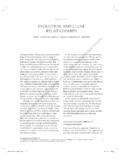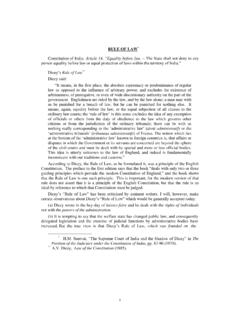Transcription of Comparing British and French Colonial Legacies: A ...
1 1 Comparing British and French Colonial Legacies: A Discontinuity Analysis of Cameroon Alexander Lee Stanford University Kenneth A. Schultz Stanford University ABSTRACT Colonial institutions are thought to be an important determinate of post-independence levels of political stability, economic growth, and public goods provision. In particular, many scholars have suggested that British institutions and culture are more conducive to growth and poverty alleviation than those of France or other colonizers. Systematic tests of this hypothesis have plagued by unobserved heterogeneity among nations due to variable pre- and post- Colonial histories. To deal with this problem, we focus on the West African nation of Cameroon, which includes regions colonized by both Britain and France. Taking advantage of the artificial nature of the former Colonial boundary, we use it as a discontinuity within a national demographic survey. We show that rural areas on the British side of discontinuity have higher levels of wealth and local public provision of improved water sources.
2 Results for urban areas and centrally-provided public goods show no such effect, suggesting that post-independence policies also play a role in shaping outcomes. We are grateful to Rachel Stein and Luke Condra for assistance with ArcGIS and to Claire Adida for assistance in translating the survey instrument. 2 Introduction The men who built the British Empire did so with the conviction that they were doing those they conquered a favor. They argued that the institutional package that they brought to the colonies David Livingston s Commerce, Christianity and Civilization would ultimately lead to a higher standard of living and quality of government than that provided by the institutions they destroyed (Livingston 1868). While contemporary scholars no longer see colonialism as unambiguously positive, they do agree on its importance. A series of quantitative studies, both within and across nations, have linked Colonial -era policies and institutions to post-independence variation in economic growth (Acemoglu, Johnson and Robinson 2001, LaPorta, Lopez-de-Silanes, Shleifer and Vishny [LLSV], 1999), public goods provision (Banerjee and Iyer 2005, Iyer 2007), democracy (Lipset 1993, Weiner 1987), and corruption (Treisman 2000).
3 One strand of this literature suggests that colonization by the British led to better outcomes than colonization by the French or by the smaller Colonial powers, because of either the adaptability of British legal institutions to the market economy or the higher levels of personal freedom provided by British culture (Hayak 1960, Lipset 1993, North 2005, LLSV 1998). The argument has become a common one, and dummy variables for Colonial background have become a common feature of large-N studies in comparative politics. One major shortcoming of such studies is that they conceal a large amount of unobserved heterogeneity in 1) the preexisting conditions of the areas colonized, 2) the institutions imposed by the colonizer, and 3) the post-independence political histories of these countries. As such, any estimation of colonizer effects may be biased, and this bias could be particularly strong with respect to the British Empire, the largest, oldest, and most heterogeneous of the imperial units.
4 It 3 could be, for example, that the British managed to take the plum colonies, which would have experienced better political and economic outcomes regardless of who colonized them. To identify the effects of Colonial legacy, we focus on one case, the West African nation of Cameroon. Originally colonized by Germany, Cameroon was divided between Britain and France during World War I, and the two powers implemented widely divergent Colonial policies in their separate zones. The two areas were only reunited at independence in 1960, and despite a strong policy of centralization, they retain separate legal and education systems and a strong attachment to the language and culture of their respective colonizers. A comparison of these regions thus permits an excellent test of the colonizer influence hypothesis. The regions became British and French colonies due to an exogenous shock unrelated to local conditions ( , the German defeat in WW I), and they have similar post-independence histories.
5 And while there might be differences in preexisting conditions across these regions, these differences are unlikely to be pronounced at the arbitrary internal boundary between them. Hence, we can use a regression discontinuity research design to identify the effects of Colonial legacy. The use of a single case keeps us from examining within-colonizer variation, but we will argue that the strategies pursued by the British and French and Cameroon present a hard case for the hypothesis of British superiority. A comparison of communities along the former Colonial border shows that rural households on the British side have higher levels of wealth and are more likely to have access to improved sources of water (a locally provided public good). These results do not hold for urban areas or for centrally-provided public goods like education and roads, suggesting that the effect of Colonial -era differences can be attenuated by post- Colonial policies. The exact origin of the British advantage are impossible to determine with certainty, but we hypothesize that it is caused 4 by a combination of hard legacies (lack of forced labor, more autonomous local institutions) and soft legacies ( common law, English culture, Protestantism).
6 The relative role of these two types of influences is a fruitful topic for future study. Previous Literature Cross Country Studies A number of distinguished scholars have argued that British Colonial origin is associated with positive outcomes, though they have not always agreed on what these outcomes are or by what mechanism British colonialism produces them. The most influential strand has focused on economic growth and argues that growth is in part determined by the legal system bequeathed by the colonizer (Hayek 1960, North 2005, LLSV 1998). The effect of legal system on development is hypothesized to operate through three mechanisms: 1) common law systems provide greater rights to investors and property owners, while 2) British culture creates a strong commitment to the enforcement of those rules that do exist, and 3) the independent judiciary and emphasis on separation of powers in common law systems provide a greater number of checks on political expropriation.
7 As North (2005: 112) argues in the context of American economic development, The heritage of British institutions created a favorable milieu for the development of the institutions of impersonal exchange which were the foundation of the long-term economic These arguments have been tested by a number of large-N studies, though these studies have tended to focus on measures of governmental policy ( which are correlated with economic growth) rather than on growth itself. LLSV (1998) find that both protections for investors and the enforcement of those protections were stronger in common law countries than in civil law 5 countries, particularly French civil law countries. The same authors (1999) find that legal origin was correlated with quality of government (corruption and public goods outputs) and size of the public sector, with civil law countries having larger public sectors. Treisman (2000) finds that common law countries have lower levels of corruption, and he also finds some evidence that this effect is due to the cultural and enforcement-enhancing effects of British culture rather than legal tradition (since common law and British colonization do not overlap perfectly).
8 Hall and Jones (1999) find that output per worker is correlated with language, with English having a particularly strong positive effect, which they see as being primarily caused by the positive economic effect of European settlement. Another strand of research has argued that British colonies are more likely to become democracies than are colonies of other nations (Weiner 1987, Huntington 1984). This effect is thought to be caused either by higher levels of political representation in former British colonies (Lipset 1993), the more gradual process of decolonization in the British Empire (Smith 1978), or the greater level of indirect rule in British territories (Whittlesey 1962). This hypothesis has received some limited support in quantitative studies (Barro 1996). The arbitrary nature of Colonial boundaries in Africa provided the starting point for a number of scholars to conduct qualitative small n-studies, generally Comparing members of the same ethnic group on different sides of a boundary.
9 Miles (1994) studied the Hausa of Nigeria and Niger, Welch (1966) the Ewe of Togo and Ghana, and Asiwaju (1976) the Yoruba of Nigeria and Benin. All argued that there were very marked differences in policy across empires, with the British -controlled areas being characterized by greater economic dynamism and respect for traditional political institutions than French -controlled areas. Miles (1994) in particular argued that these differences have persisted since independence, though it is difficult in practice to 6 separate this persistence from the effects of the different post-independence political histories of Niger and Nigeria. One facet of Colonial influence that has received relatively little attention is the role of religion. Max Weber (1947 [1905]) argued that Protestantism was ideologically well suited to a market economy, and that the hard work and repression of consumption that it encouraged promoted capital accumulation. Becker and Woessman (2009) used an instrumental variables design to show that a more important causal factor was the increase in literacy caused by Protestantism s greater textual emphasis.
10 The economic efficiency of Protestantism is supported by Acemoglu, Johnson and Robinson (2001) who found evidence for the effect of religion on per capita income. Some scholars have also argued that the emphasis on the individual in Protestantism is helpful to the growth of democratic institutions (Lipset 1981, Huntington 1991). As religious traditions are strongly correlated with Colonial origin, it may well be that some part of the cultural legacy of colonialism operates through religion. Critiques of the Cross Country Literature The positive effect of British Colonial influence has not gone uncontested. Acemoglu, Johnson and Robinson (2001) find that dummy variables for Colonial origin have a jointly insignificant effect on per capita income, while Acemoglu, Johnson, Robinson and Yared (2007) and Prezworski et al. (2000) find that these dummies did not have a significant effect on post-independence democracy. In general, the theoretical critiques have emphasized the large-scale unobserved variation in preexisting conditions, actual Colonial institutions, and/or post- Colonial policies.










